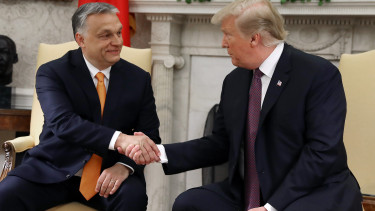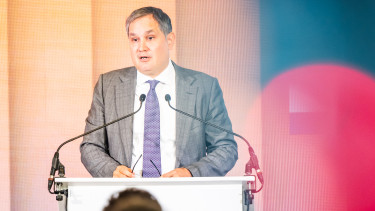It's time to chill out: Europe will not plunge into a crippling crisis

A recession in Europe is not a sure bet, and even there is one, it will be mild and brief
The European economy is being seriously affected by the rise in energy prices, and the public often talks of an inevitable recession in the old continent. In the summer, when gas prices were hovering around EUR 350 and there was no certainty about this year's gas supply, we heard quite pessimistic statements about the European economic outlook, and expectations of a deep recession were not uncommon.
The incoming data do not yet provide a clear picture: the third quarter turned out to be rather good (+0.2 q/q, +2.1% yr/yr), and for the fourth quarter only surveys (e.g. purchasing managers' indices, the German Ifo index) are available which, although they provide a good picture of the current situation and expectations of economic agents, do not reflect the precise and actual state of the economy. We have hard data only for the third quarter, when the European economy performed surprisingly well compared to expectations.

However, the impact of the energy crisis is likely to be felt mainly in the fourth quarter, when countries' energy demand is affected by the demand for gas and electricity for heating. The increase in energy bills could put pressure on investment and consumption, and one of the key questions is whether the rise in energy prices will have a crowding-out effect that will cause the continent's economy to shrink.
We project a recession in the Eurozone, starting in Q4 this year until Q2 2023. We expect this recession to remain a shallow one (with a peak-to-trough decline of 1.1%),
Hélène Baudchon, senior economist at BNP Paribas (head of the OECD countries research team), wrote to Portfolio in her e-mailed response. Analysts at the French bank expect GDP to decline by 0.5% on annual average in 2023 (after +3.2% in 2022). They think Germany will be the most impacted economy among the big four Eurozone countries, followed by Italy, Spain and France.
Baudchon noted that thus far, the Eurozone economy has proven more resilient than expected, but the combination of the inflationary shock, the energy crisis and the enforced monetary tightening and their increasingly negative effects are likely to overcome this resistance.
"The ongoing deterioration in surveys data (business as well as consumer confidence) point to a GDP contraction in the near-term. We expect the recession to remain shallow thanks to fiscal policy cushion and the current tightness of the labour market," she added.
THE ABOVE RESPONSE SUPPORTS THE EXPECTATION THAT THE RECESSION EXPECTED TO HIT THE EURO AREA WILL BE MILD AND SHORT-LIVED.
If a recession hits at all... because, let's face it, the forecasts are spread in a relatively wide range. The European Central Bank, for example, does not yet expect a contraction in 2023, although ECB chair Christine Lagarde already indicated at the last rate-setting meeting that the September forecast of 0.9% for next year was no longer sustainable, and the overall picture had deteriorated somewhat.
Erste Bank's Eurozone macro analysts Rainer Singer and Gerald Walek don not projection a recession for the bloc. They expect growth of 0.3% in 2023 and 0.7% in 2024, with only one quarter of eurozone GDP growth turning negative.
After a surprising strong performance in 3Q 2022 (0.2% q/q) we forecast slight negative GDP-growth for 4Q 2022. For 1Q 2023 we already project a return to growth, albeit at a slow pace given the difficult market environment,
they said in an e-mailed response to Portfolio.
"Since we expect a gradual easing of inflationary pressures throughout 2023 we forecast a gradual improvement of the economic situation of the Eurozone as the year progresses," they added.
Energy price surge not the only woe for the economy
For the time being it seems that a level of around EUR 100/MWh is a digestible level since the industry has already reacted and lowered its gas demand in 2022 so far, said Singer and Walek. They reminded that gas consumption in Germany declined in 2Q 2022 by 22% yr/yr or in France by 13% yr/yr.
Nevertheless the probability of a recession of the Eurozone is still elevated with a gas price of EUR 100/MHh – maybe around 30 to 40%,
they said.
Currently, the price of gas is hovering around €110 per megawatt hour on the Dutch gas exchange, after sharply falling throughout the autumn from a peak of €350 at the end of August. Gas prices have stabilised above €100 in recent days, but it remains to be seen whether the price can break through this level southbound.
At BNP Paribas they think that because of the lagged and mounting negative effects of the above-mentioned shocks (inflation, energy, monetary), a recession in the eurozone is unavoidable, regardless the level of natural gas prices.
However, the lower these prices, the less severe the recession,
said Baudchon.
She noted that while the high price of natural gas is indeed an important driver of the expected recession, it's only one of various other factors. "Inflation in the Eurozone is still for a large part energy-driven but core and food inflation have also become important drivers and these latter will take time to slow down, meaning a restrictive ECB monetary policy for some time to come," she added.
Beyond the short-term effects, it is also crucial how the longer-term gas supply in Europe will turn out and how long prices can remain high enough to stymie economic growth. Singer and Walek wrote in this context that, due to [energy] savings measures and the improved ang growing infrastructure for liquefied natural gas (LNG) import, they expect
GAS PRICES IN EUROPE to GRADUALLY DECLINE IN THE MEDIUM TERM.
"For 2023, however, decisions in China pose a slight upside risk for the LNG prices." In the first half of 2022 Europe benefited from a substantial decline of Chinese LNG demand (around 30% yr/yr), they pointed out, adding that the main reason seems to have been the strict Covid policy (lockdowns) in China.
So a potential reopening of Chinas economy in 2023 would trigger higher LNG demand which would quite likely have an impact on the European gas prices as well.
Should not be concerned about rising unemployment
A slowdown or possible downturn in the economy naturally leads to rising unemployment. In the euro area, a significant rise in unemployment has been avoided during the coronavirus crisis, mainly through fiscal support (notably through supporting reduced working hours across the continent). Low unemployment makes the economy more resilient in a deteriorating external environment, but a rise in job losses seems inevitable in the coming quarters. The ECB already expects that the unemployment rate could rise in the coming quarters.

The unemployment rate is bound to rise given the expected contraction in activity. Employment expectations of the corporate sector have already turned down,
wrote Hélène Baudchon.
At the same time, she believes that "the current tightness of the labour market (as illustrated by still important hiring difficulties) should support labour hoarding by firms, therefore limiting the rise in the unemployment rate."
Short-time working schemes could also be activated.
In case of a moderate recession, there is no need for governments to expand these schemes like during the lockdowns in 2020, she added.
Short-time working was first used on a large scale in Germany during the 2008-2009 financial crisis, and has been applied in most European countries during the coronavirus pandemic. The scheme involves central government paying part of the wages of employees who might otherwise lose their jobs if their employer keeps them on the payroll on reduced hours instead of making them redundant. Thus, the programme requires significant fiscal capacity to be widely implemented, while the countries have exhausted a significant part of their resources during the Covid crisis.
The analysts polled, however, do not expect a substantial rise in the jobless rate: "In general we do not expect a substantial increase in unemployment despite the difficult business environment. It is still a challenge for companies to find skilled workers, we thus expect companies to be careful with laying off people even though the business outlook is worsening," wrote Singer and Walek. Erste Bank does not make detailed forecasts for Eurozone unemployment figures, though.
"We expect that, if necessary, Eurozone countries dispose over enough fiscal leeway to provide financial support to unemployed people. Since the current inflation is to a large extent driven by supply side constraints we would not expect that fiscal support for unemployed workers will cause additional inflation," they added.
Inflation to start abating soon, but the outlook is murky
Inflation in the euro area continues to cause serious difficulties for its citizens, with price rises well above 10% in October. The euro area has not seen such a rise since its inception and inflation in individual Member States has not been this high since the 1980s. The rate of price increases continues to rise and the question of when inflation will peak is still an important one.

We think that the ECB’s inflation target of 2% could be reached in 2024, as the supply distortions triggered by COVID and by the war in Ukraine this year should lose their impact and together with an overall weak economy over the coming two years should bring down inflation substantially,
wrote Singer and Walek. The analysts at Erste project 2023 annual average inflation at 5.3%, saying the main driver of the receding CPI will be stabilising or moderate decreasing energy prices.
The analysts polled by portfolio agree that inflation will return to the ecb's target by 2024.
BNP Paribas forecast 5.7% annual average inflation for next year and 2.3% for 2024. "We expect Eurozone inflation to be back to the 2% target by the end of 2024," wrote Baudchon.
"We see the disinflation process as a long one because inflation is currently very elevated and broad-based. Except a big drop in demand (not our baseline), we think inflation will prove sticky because of the lagged effects of past price increases, elevated wage growth, euro weakness and fiscal support," she added.
She noted that the risk to their baseline inflation scenario is to the upside indeed.
"Inflation could prove more sticky than expected, disinflation more limited. But, by the end of 2024, the odds are nonetheless high that inflation will be close to 2%. Even if this is a bit above, this will be a satisfactory outcome for the ECB."
The risk for a stubbornly high inflation cannot be ruled out, but we assess it as low,
wrote Singer and Walek.
"But for the years ahead the economy will be confronted with new trends not seen before or not seen for decades, respectively and how the will impact inflation cannot be assessed currently. The fight against climate change and all the structural changes involved and secondly a lasting shortage of labour make the outlook for the next several years highly uncertain," they added.
Where could ECB rates peak?
"The ECB will have to hike its policy rates above the neutral rate (estimated at about 2% in nominal terms) and go and stay for a while in restrictive territory to combat inflation, meaning, yes, policy rates will be at a level that hurts the real economy," wrote Baudchon.
"A slowdown in demand is needed to tackle inflation," she added.
BNP Paribas forecasts that
the refinancing rate will reach 3.50% by the end of Q1 2023 (3.00% for the deposit rate), from 2% currently (1.5%), and stay there till the end of 2023.
So far this year, the ECB has raised interest rates three times: in July, the benchmark refinancing rate was increased by 50 basis points to 0.5%, and in September and October the Frankfurt central bank raised rates by 75-75 basis points. This is the first time in the central bank's short history that it has hiked rates by 75 basis points.
We expect the ECB to raise the Main Refinancing Rate to 2.5% and the Deposit Rate to 2.25% by February,
wrote Singer and Walek.
They think this is a "mildly restrictive interest rate level" which "should be seen as sufficient to bring down inflation, as high energy prices are already weighing heavily on the economy and a large part of euro area inflation is due to supply side effects, where interest rates can do little."
Cover photo: Getty Images







